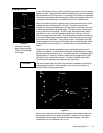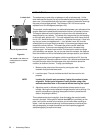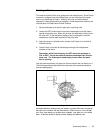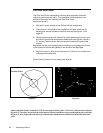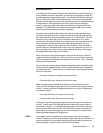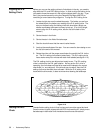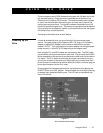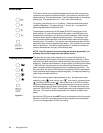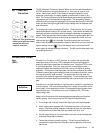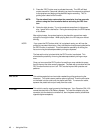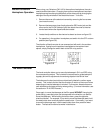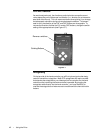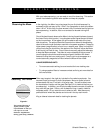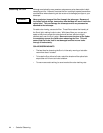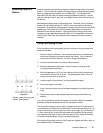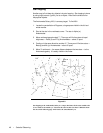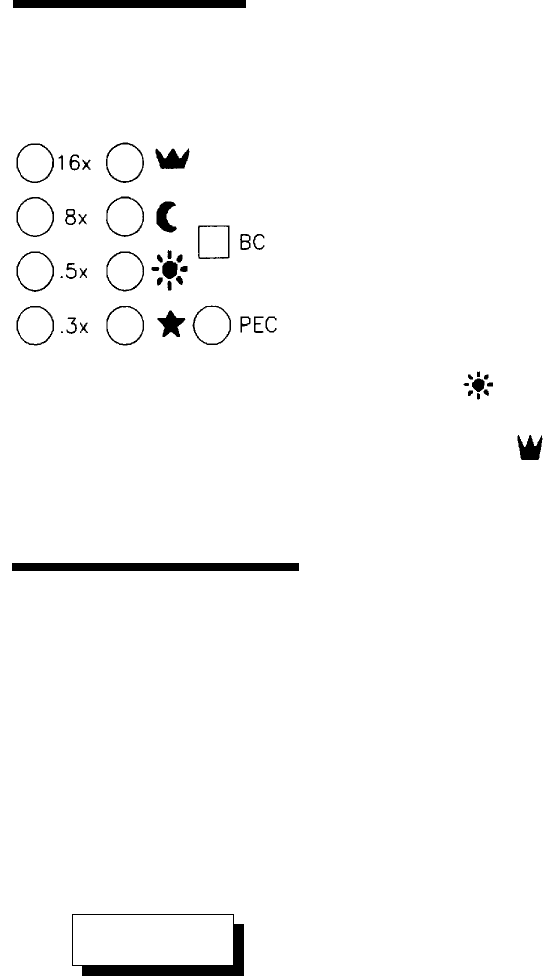
Using the Drive • 39
RATE
The BC (Backlash Correction) function allows you to eliminate the backlash in
the DEC motor when changing directions (i.e., from north to south or vice
versa). Here’s how it works. Each time you change the direction of the
telescope in declination, the motor speeds up momentarily to take up any
slack. The Tracking Rate and Guide Speed displays are used to regulate the
"aggressiveness" of the backlash compensation. The best setting is deter-
mined by looking through the eyepiece while changing the direction of the DEC
motor and then moving through the BC button settings until the backlash has
been eliminated.
To activate this function, press the BC button. Once activated, the .3x guide
speed and sidereal tracking LED will flash rapidly. Use the east and west (left
and right) buttons on the hand control to change the backlash compensation
speed. Press the right hand control button and the next guide speed light (.5x)
will illuminate. When the hand control button is pressed four times, the next
tracking rate light ( ) will illuminate. Continue pressing the hand control
buttons until the desired compensation speed is reached or until you reach the
highest setting (16x and ). Once the desired level is set, press the BC
button again to activate backlash correction. The BC must be reset each time
you power up the drive.
Periodic Error Correction, or PEC for short, is a system that improves the
tracking accuracy of the drive. PEC is designed to improve photographic
quality by reducing the amplitude of the worm errors. Using the PEC function
is a two-step process. First, you must guide for at least eight minutes —
keeping the guide star centered on the cross hairs of your optional guiding
eyepiece — during which time the system records the corrections you make.
(It takes the worm gear eight minutes to make one complete revolution, hence
the need to guide for eight minutes). The second step is to play back the
corrections you made during the recording phase. The microcomputer inside
the electronic console does this automatically after one revolution of the worm
gear.
Periodic error is a slight oscillation in right ascension caused by imperfections
in all drive gears. The cycle of the periodic error is equal to the rotation of the
[worm] gear, in this case eight minutes. All telescope drives with gears have
some periodic error. The periodic error of your Celestron CM-1100 is very
slight to begin with.
Keep in mind, this feature is for advanced astrophotographers and requires
careful guiding. Here’s how to use the PEC function most effectively.
1. Find a bright star relatively close to the object you want to photograph.
2. Insert a high power eyepiece with illuminated cross hairs into your tele-
scope. Orient the guiding eyepiece cross hairs so that one is parallel to
the declination axis while the other is parallel to the R.A. axis.
3. Center the guide star on the illuminated cross hairs, focus the telescope,
and study the periodic movement.
4. Take a few minutes to practice guiding. This will help you familiarize
yourself with the periodic error of the drive and the operation of the hand
control box.
Periodic Error Correc-
tion
(PEC)
BC — Backlash
Correction
Figure 5-4—The guide rate and
tracking rate lights are used to
indicate the amount of
backlash correction.
Definition:



